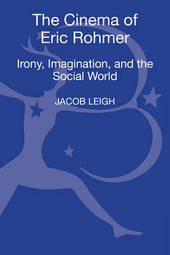
|
The Cinema of Eric Rohmer: Irony, Imagination, and the Social World
Hardback
Main Details
| Title |
The Cinema of Eric Rohmer: Irony, Imagination, and the Social World
|
| Authors and Contributors |
By (author) Jacob Leigh
|
| Physical Properties |
|
| Category/Genre | Individual film directors and film-makers |
|---|
| ISBN/Barcode |
9781441171399
|
| Classifications | Dewey:791.43023309 |
|---|
| Audience | | Professional & Vocational | |
|---|
| Illustrations |
20
|
|
Publishing Details |
| Publisher |
Continuum Publishing Corporation
|
| Imprint |
Continuum Publishing Corporation
|
| Publication Date |
3 May 2012 |
| Publication Country |
United States
|
Description
Since the death of the French film director Eric Rohmer in 2010, interest in his work has reignited. Known as the last of the established directors in the French New Wave, Rohmer took complete control over all his films, acting as his own producer throughout his career, and writing the scripts. He also made his mark by taking the lead in casting and location scouting - as French seaside resorts with beautiful young people are some of the elements present in most of his films. Combining history and criticism, Jacob Leigh pens the first chronological survey of this understudied filmmaker in order to give readers clear insights into how Rohmer's films came about and what he intended them to be. The book provides in-depth analysis of the themes and ideas of Rohmer's twenty-three feature films, and illustrates the complexity of their cinematic style. Leigh's study is the perfect introduction to the work of this great filmmaker, for both students and the general reader.
Author Biography
Dr. Jacob Leigh is Lecturer in the department of Media Arts at Royal Holloway, University of London, UK.
ReviewsStill grieving Eric Rohmer, I applaud this even-handed discussion of his 23 feature films. Jacob Leigh steers clear of cant (whether from theorists or Catholics), sticking close to this consistently intelligent, surprising, and beloved oeuvre. Sensitive to the master's seductive draw and tonic irony, Leigh uncovers a calculated method and discovers the relevance of classic concerns. -- Dudley Andrew, R. Selden Rose Professor of Film and Comparative Literature, Yale University, USA At a time when the hackneyed phrase 'the magic of the movies' seems to apply only to special effects spectacles, Eric Rohmer's films remind us that cinema's greatest magic is its intimate engagement with reality. In this book, Jacob Leigh effectively articulates the ways that Rohmer's commitment to this truth is developed across dozens of films. A fine and much needed study of a filmmaker whose works appear more impressive and essential with each passing year. --Christian Keathley, Associate Professor of Film & Media Culture, Middlebury College Jacob Leigh's rich and erudite book is filled with subtle analyses that do justice to the complexity, delicacy, and sensuousness of the work of one of the greatest filmmakers. Both newcomers to Rohmer and those who know his films well will find much that is fresh and stimulating in Leigh's detailed and penetrating close readings. -- Chris Fujiwara, Artistic Director, Edinburgh International Film Festival Leigh (Royal Holloway, Univ. of London, UK) avoids the well-trod paths of Rohmer's Catholicism and the nouvelle vague moment to provide fresh, close, illuminating readings of the master's 23 feature films, all now available on video or DVD....In providing evidence, Leigh balances telling dialogue with the unique inflection of cinematic devices. And he explores the individual films and their sequence without trimming them to an overarching theory or expectation, other that Rohmer's celebration of life. This would be an excellent companion for those working through the Rohmer DVDs. There are 83 pages of worthy notes and a 28-page bibliography, but only a smattering of small, in-text stills. Summing up: Recommended. Lower-division undergraduates through faculty; general readers -- M. Yacowar, emeritus, University of Calgary * CHOICE * Recommended. * Times Higher Education Textbook Guide * A major achievement from one of the leading Rohmer scholars. As the last few paragraphs make clear, cinema has lost a major voice in Rohmer: his "optimism, hope and faith in humanity" are rare commodities these days. Leigh reminds us throughout that the films left behind are full of a delightful tension: there are strong undercurrents of romanticism aching to break through the surface of these elegant, erudite films. -- Ben McCann, University of Adelaide, Australia * Screening the Past *
|